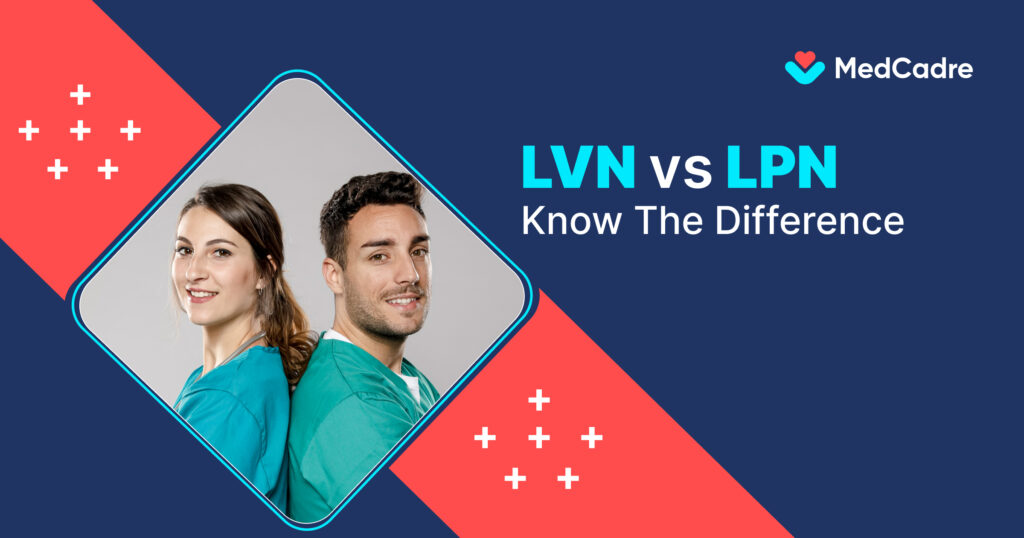Are you considering a career in the nursing profession? You might have stumbled upon the titles Licensed Practical Nurse (LPN) and Licensed Vocational Nurse (LVN). Are these titles the same? Or have a different job role. The LPN & LVN are both a Licensed Nursing professional, today through this blog we will learn the difference between LVN vs LPN in the healthcare sector. So let’s get in!
What is an LVN vs LPN
There is no difference between LVN and LPN, they are essentially the same. They both are licensed nurses who provide basic care to patients in various healthcare settings, or departments. They work under the supervision of registered nurses (RNs) and physicians, the jobs they perform every day include:
- Monitoring vital signs (temperature, blood pressure, respiration)
- Assisting with daily living activities like bathing, dressing, and eating
- Administering medications (orally, topically, by injection – depending on state regulations)
- Changing dressings and wounds
- Collecting lab specimens
- Documenting patient care
They have to undergo similar educational and certification programs, and the program typically lasts one year and culminates in a diploma or certificate. These programs cover subjects necessary for patient care, helping learners gain the knowledge and skills they need including:
- Anatomy and physiology
- Nursing fundamentals
- Pharmacology
- Medical-surgical nursing
- Maternal-newborn nursing
- Mental health nursing
After completing their programs and passing the National Council Licensure Examination for Practical Nurses (NCLEX-PN), they become licensed to practice in their respective states. This exam plays an important role in becoming an LVN vs LPN.
Same responsibilities but different states
LVN and LPN are essentially the same in terms of education, job roles, responsibilities, and every other aspect, except for the terminology. Some states in the USA refer to them as LPNs, while others use the term LVNs. It’s just a matter of place.
- LPN (Licensed Practical Nurse): This title is used in most states across the United States.
- LVN (Licensed Vocational Nurse): This title is primarily used in California and Texas.
Essentially, it’s a matter of terminology. Think of it like a regional accent – the core function remains the same, but the way it’s referred to varies by location only.
What are the other differences?
While the primary functions are similar for both LVN vs LPN the only difference is the practice which depends on the state to state, i.e. some states may have LPN/LVN-specific medicine administration requirements. It’s important to take care of the state nursing board for relevant practice information in your location.
The process to become an LPN and LVN
LPN and LVN are the same thing. They are both licensed nurses who provide patient care under the supervision of registered nurses (RNs) or doctors. Below are the steps to become an LVN vs LPN you need to follow:
- Education: Earn a diploma or certificate from an accredited LPN/LVN program. These programs are typically offered by community colleges, vocational schools, and hospitals and take about one year to complete. The coursework covers nursing fundamentals, anatomy and physiology, pharmacology, and clinical skills.
- Licensure: Pass the National Council Licensure Examination for Practical Nurses (NCLEX-PN). This computer-based exam tests your knowledge and skills in providing patient care. You can apply for the NCLEX-PN after completing your LPN/LVN program.
- Earn additional certifications: Once you are licensed, you can pursue additional certifications in specific areas of practice, such as geriatrics or wound care that help you to explore job opportunities in various healthcare settings like:
- Hospitals
- Nursing homes
- Clinics
- Doctor’s offices
- Home healthcare agencies
Conclusion
Whether you choose LVN vs LPN, the title signifies a noble profession dedicated to patient care. These nurses play a vital role in ensuring the well-being of patients in various healthcare settings. If you’re passionate about helping others and drawn to a fast-paced, rewarding career, then becoming an LPN/LVN could be the perfect first step on your nursing journey. Remember, the most important factor is your dedication to providing compassionate care and making a positive difference.


